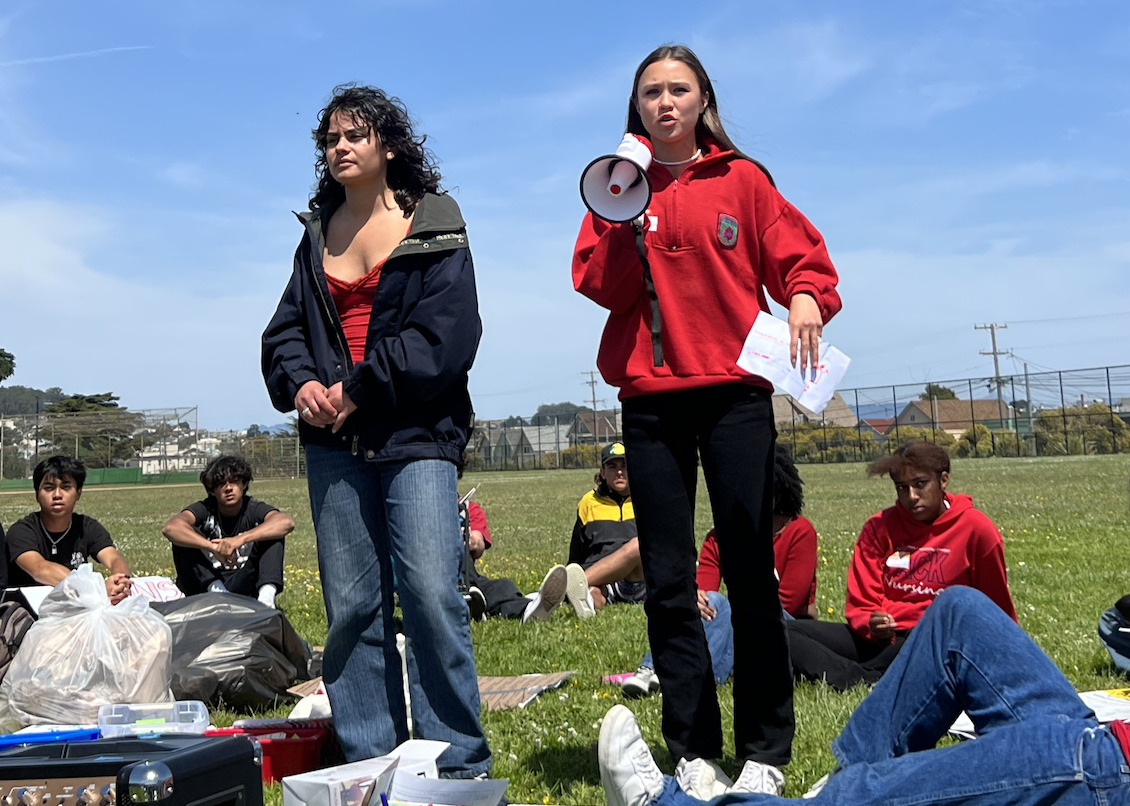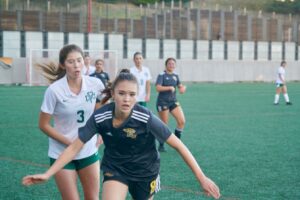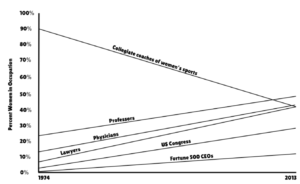Last April, over 300 Lick-Wilmerding High School students walked out of school to raise awareness about sexual assault (SA) and sexual harassment (SH) in the community. Since the protest, community members have pioneered efforts to enact change.
On April 29, walkout leaders led students down Ocean Avenue to Balboa Park. Once there, attendees participated in many activities. These included discussions in small groups, an open mic and opportunities for students to draft a list of changes they wanted to see occur at LWHS in regards to SA and SH culture. Students were encouraged to wear all black and walkout leaders wore red in hopes of creating an image of unity. The atmosphere was one of anger and frustration but also of hope and determination to create change and educate the community. The walkout itself was entirely student organized and run as a non-school event where no faculty were present.
The walkout leaders founded the Anti-Sexual Assault and Harassment Working Group, Formed in January of 2022 by 13 members of the Class of 2022, 2023 and 2024 who were leaders of clubs and affinity spaces for women, the working group still exists and is continuing its efforts to confront rape culture and increase consent education at LWHS. According to a United Nations article, “Rape culture is the social environment that allows sexual violence to be normalized and justified, fueled by the persistent gender inequalities and attitudes about gender and sexuality.” Rape culture goes beyond just SA and SH; it’s often defined a a pyramid, with SA or SH at the top, built on behaviors and common practices such as “slut shaming” or toxic standards of masculinity.
Sophie Spokes ’23, a leader of the walkout, explained, “the goal of the walkout was to raise awareness about rape culture and the downsides of [hookup culture at LWHS] and most importantly, just disrupt the silence and change our conversations.” This included changing conversations surrounding rape culture and confronting silence both within the student body and also from the LWHS administration.
One response to the walkout was a mandatory consent assembly for Juniors and Seniors, which took place November 10. This included a performance from Piedmont High School students, who acted out true, local stories about SA/SH The theater group was brought to LWHS by Natasha Singh, a sexual literacy educator, in partnership with the Piedmont High School theater director, Kimberly Tailor.
Student Body President and another leader of the walkout, George Duran ’23, was impressed with the assembly overall. “I thought it was very impactful,” he said. However, he said “there could have been certain changes with content warnings.” He expressed gratitude that the event happened somewhat early in the school year.
Duran also said the school counselors had open communication with the working group as to what role the they wanted in the assembly. “Counselors were reaching out to the working group asking if we wanted to speak and if we wanted to work with them,” he said.
Other LWHS students had varying experiences with the assembly. “It was a bit heavy and I definitely wasn’t prepared to go into that,” Nathan Rivera ’24 said. He thought there should have been more time to “decompress” afterwards.
Although the assembly provided examples of non consensual sexual interactions, leaders discussed how it should not be the end of education around SA and SH. According to Duran, the Sam Mihara Days of Justice this year will likely be centered around sexual violence.
Working group member Emily Lam ’23 said that as an effect of the walkout and assembly, “students can realize that consent education can become a student-led thing.”
One of the working group’s main projects is constructing a list of demands to present to the administration and the student body. The demands come from lists of changes brainstormed by walkout participators. “Right now we’re working on compiling those and editing each demand in a way that we can implement,” said Spokes.
Duran explained that the list will become accessible to the student body once the working group finds the most effective way to clearly communicate the list’s purpose and meaning to students.
The finalized list includes 10 demands that cover many different topics from improving counseling for survivors to providing more comprehensive consent education. At the beginning of the year, the list was shared with the counselors as many of the demands had to do with the mandated reporter policy and a request to hire a third counselor specialized in helping survivors of sexual violence.
Duran said that the overall response from the counselors was supportive, but due to time constraints, the working group and the counselors have not been able to formally meet yet.
So far the list of demands has been shared with Director of The Center for Civic Engagement and co-interim Director of Student inclusion Christine Godinez Jackson, Dean of Adult Equity and Inclusion and co-interim Director of Student inclusion Dee Johnson, Interim Head of School Katie Titus and the counselors: Erika Solis and Yuka Hachiuma. Duran explained, “We’re trying to be intentional about how we present the listed demands.”
Currently, the working group has been re-grouping and determining its path forward. “We’re at a point in the process where we want to set ourselves up for success,” Duran explained. Due to workload and the college applications season, the group has not been able to meet regularly. After winter break, the group will start meeting and working in earnest, according to Duran.
One of the group’s goals is to continue to exist even after the current leaders graduate. “I hope it continues being an initiative and just a group on campus,” Duran said. He pointed out that the issue of SA and SH and its discussion will not be going away anytime soon.
Similarly, Spokes shared her vision for the future. She wants to continue promoting “the idea of consent around the school, maybe having different clubs or groups that talk about it more.”
Spokes explained that although the walkout was about one main topic, “everyone in the working group kind of had different reasons why we joined.”
Lam referenced the walkout’s mission statement when discussing their goals. “Our goal was to start a conversation and enact change around the culture of the institution. And, of course, also to highlight the voices of survivors,” they said.
Lam considers the walkout to be a success because it started a conversation. “The fact that the walkout got participation from over half the student body is a pretty big success in of itself that it garnered a lot of community participation” they said.
Spokes explained that her motivation was to “raise awareness within the student body that there is this unspoken hookup culture that goes on [at LWHS] that is really harmful.”
Spokes talked about how the walkout changed people’s opinions. “I did see a shift in the culture. Not just the culture of what was happening at parties, but more about how people talked about different people hooking up, as well as different sexual assault situations.”
Duran shared that a tangible effect of the walkout is people calling out others for making disrespectful or sexist comments, or making problematic jokes. He also noted that it will take more to change the culture at LWHS. “It’s hard for just one event to really impact a deep culture that’s ingrained,” he said.
Spokes said, “people are just more aware of it (hookup/rape culture at LWHS), even if that awareness was subconscious, which I think was really important.”
Rivera shared a similar sentiment. “I feel there’s a bit more awareness in terms of what’s happening and what the policy is in terms of sexual assault and sexual harassment.”
Another important issue that was raised at the walkout was transparency with the federal mandated reporter policy. A mandated reporter is a professional who is legally required to report if they suspect a minor is being abused. This includes all the adults at LWHS.
The purpose of mandated reporting is that if a child is at risk and a reporter finds out, the child can be helped in order to prevent further harm and silence. However, some may feel that lack of commnication about mandated reporting can make it challenging for a survivor to go to trusted adults (counselors, for example) to talk about an occurrence. Lam explained that leaders of the walkout wanted to increase “awareness and transparency around the reporting process and what it actually means to make a report.”
A google doc labeled “Student Handbook: Annotated,” which can be found in SA & SH Reporting folder under the resources tab of the LWHS website reads in part, “As mandated reporters, LWHS employees are required to report suspected neglect or abuse of a minor, including sexual abuse. Under California law, mandated reports are confidential, so LWHS may not be able to share information about the report or whether a report has been filed, even to the student’s family.”
The walkout has yielded some change both culturally and curricularly, but whether those changes will continue is yet to be determined.







